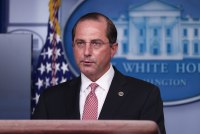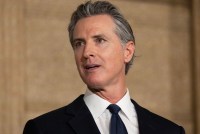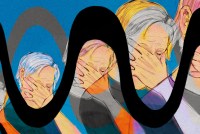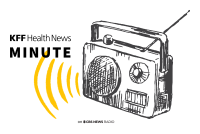Latest KFF Health News Stories
Mary Lou Retton’s Explanation of Health Insurance Takes Some Somersaults
The gold-medal gymnast’s explanation of why she remained uninsured has health policy experts doing mental gymnastics — because it makes little sense.
Trump Official Who OK’d Drugs From Canada Chairs Company Behind Florida’s Import Plan
Alex Azar advanced Canadian drug importation as Donald Trump’s secretary of Health and Human Services. Now he chairs the board of a company managing Florida’s importation program.
What Would a Nikki Haley Presidency Look Like for Health Care?
Former South Carolina Gov. Nikki Haley’s tenure in the Palmetto State — which overlapped with several tumultuous years of health care reform — and her recent comments offer clues to how her presidency might affect national health care policy.
What the Health? From KFF Health News: All About the (Government) Funding
With days to go until a large chunk of the federal government runs out of money needed to keep it operating, Congress is still struggling to find a compromise spending plan. Meanwhile, the Supreme Court agreed to hear — this year — a case that pits federal requirements for emergency treatment against state abortion bans. Alice Miranda Ollstein of Politico, Sarah Karlin-Smith of the Pink Sheet, and Tami Luhby of CNN join KFF Health News chief Washington correspondent Julie Rovner to discuss these issues and more. Also this week, Rovner interviews American Medical Association President Jesse Ehrenfeld about the choppy waters facing the nation’s physicians in 2024.
In a Fractious Rerun, GOP Rivals Haley and DeSantis Debate Health Care. Trump Sits It Out.
The fifth debate of the 2024 GOP presidential primary season took place days before Iowa Republicans will caucus to determine their pick for the top of the party’s ticket. The front-runner, former President Donald Trump, once again did not participate.
Delays in State Contracts Leave Montana Health Providers Strapped
The Montana Department of Public Health and Human Services is months behind in paying organizations contracted to connect people to care. The interruption is likely to have lasting effects, even after the state catches up.
Delicate Labor-Industry Deal in Flux as Newsom Revisits $25 Minimum Health Wage
In spite of labor concern about any rollback, Gov. Gavin Newsom is revisiting California’s planned $25 minimum wage for health workers less than three months after approving the measure despite an uncertain price tag. The projected $4 billion first-year cost forms part of the state’s estimated $38 billion deficit.
California Offers a Lifeline for Medical Residents Who Can’t Find Abortion Training
Abortion restrictions in 18 states have curtailed access to training in skills that doctors say are critical for OB-GYN specialists and others. A new California law makes it easier for out-of-state doctors to get experience in reproductive medicine.
Mammography AI Can Cost Patients Extra. Is It Worth It?
Artificial intelligence software to aid radiologists in detecting problems or diagnosing cancer has been moving rapidly into clinical use, where it shows great promise. But it’s a turnoff for some patients asked to pay out-of-pocket for technology that’s not quite ready for prime time.
Rising Malpractice Premiums Price Small Clinics Out of Gender-Affirming Care for Minors
Even in states where laws protect minors’ access to gender-affirming care, malpractice insurance premiums are keeping small and independent clinics from treating patients.
There’s a New Covid-19 Variant and Cases Are Ticking Up. What Do You Need to Know?
The covid-19 virus is continually changing, and a recent subvariant, the JN.1, is rapidly climbing the charts.
States Begin Tapping Medicaid Dollars to Combat Gun Violence
The Biden administration is allowing states to use money from the insurance program for low-income and disabled residents to pay for gun violence prevention. California and six other states have approved such spending, with more expected to follow.
Listen to ‘Tradeoffs’: How the Loss of a Rural Hospital Compounds the Collapse of Care
Six years ago, the hospital in Fort Scott, Kansas, shuttered, leaving residents in the small community without a cornerstone health care institution. In the years since, despite new programs meant to save small hospitals, dozens of other communities have watched theirs close.
What the Health? From KFF Health News: New Year, Same Abortion Debate
Some Supreme Court justices were wrong if they assumed overturning “Roe v. Wade” would settle the abortion issue before the high court. At least two cases are awaiting consideration, and more are in the legal pipeline. Meanwhile, Congress once again has only days until the next temporary spending bill runs out, with no budget deal in sight. Lauren Weber of The Washington Post, Shefali Luthra of The 19th, and Victoria Knight of Axios join KFF Health News chief Washington correspondent Julie Rovner to discuss these issues and more. Also this week, Rovner interviews Sandro Galea, dean of the Boston University School of Public Health, about how public health can regain public trust.
Most People Dropped in Medicaid ‘Unwinding’ Never Tried to Renew Coverage, Utah Finds
Medicaid officials in Utah conducted a survey to answer a burning question in health policy: What happened to people dropped from the program in the post-pandemic “unwinding”?
Woman Petitions Health Insurer After Company Approves — Then Rejects — Her Infusions
Even people with good insurance aren’t guaranteed affordable care, as this KFF Health News follow-up to one patient’s saga shows.
Doctors Are as Vulnerable to Addiction as Anyone. California Grapples With a Response.
The Medical Board of California, which licenses MDs, is developing a program to evaluate, treat, and monitor doctors with alcohol and drug problems. But there is sharp disagreement over whether those who might volunteer for the program should be subject to public disclosure and over how much participants should pay.
Patients With Narcolepsy Face a Dual Nightmare of Medication Shortages and Stigma
It’s been more than a year since the FDA declared a national shortage of Adderall, and it’s affecting more than just patients with ADHD. Those with narcolepsy, a much rarer condition, are often treated with the same medication. Without it, they’re often unable to drive or function as usual.
California Is Poised to Protect Workers From Extreme Heat — Indoors
Only a few states have rules to protect workers from the growing threat of extreme heat, either indoors or outdoors. California is expected to adopt heat standards for indoor workers in spring, even as federal legislation has stalled.
Listen to the Latest ‘KFF Health News Minute’
“Health Minute” brings original health care and health policy reporting from the KFF Health News newsroom to the airwaves each week.

























